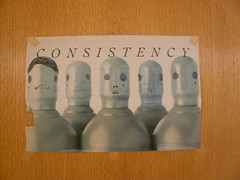From Dictionary.com
em·pa·thy
1. the intellectual identification with or vicarious experiencing of the feelings, thoughts, or attitudes of another.
2. the imaginative ascribing to an object, as a natural object or work of art, feelings or attitudes present in oneself. By means of empathy, a great painting becomes a mirror of the self.
sym·pa·thy
1. harmony of agreement in feeling, as between persons or on the part of one person with respect to another.
2. the harmony of feeling naturally existing between persons of like tastes or opinion of congenial dispositions.
3. the fact or power of sharing the feelings of another, especially in sorrow or trouble; fellow feeling, compassion, or commiseration.
4. sympathies
a. feelings or impulses of compassion.
b. feelings of favor, support or loyalty: It's hard to tell where your sympathies lie.
5. favorable or approving accord; favor or approval: He viewed the plan with sympathy and publicly backed it.
The point has been made by some of my friends battling OCPD is that it's not that they necessarily lack empathy (though sometimes they do). In fact, when someone they love is hurting, they are often all knotted up inside, hurting with and for their partner, but often, none of that shows on the outside.
| Spock (Photo credit: Tram Painter) |
It's not really fair to expect another person to be a mind-reader and to know what we need, especially if we know or suspect s/he has trouble "connecting" with emotions, let alone ours. One spouse shared that when she is sick with a cold or the flu, what she wants is to be periodically checked on, for her partner to offer to bring her water or juice or soup or tissue. Her husband wants to be left the hell alone, just let him go to bed, close the door, and don't bother him.
So, until they actually discussed this, they were each irritating the hell out of one another. The wife felt unloved and neglected, the husband annoyed by her solicitousness. "Do unto others as you would have them do unto you" is an excellent rule of thumb, but sometimes it requires some fine-tuning.
Sometimes the hugs need to be coached.
a. "Sure, can I make you a drink first while you change out of your work clothes?"* Followed by decent listening, and a hug - sometimes good, sometimes Sheldon-style. (But never, ever the back rub. Back rubs are icky.)
b. "You think you had a hard day? Listen to this..."
c. Allowed to begin, but interrupted five minutes into my rant by his work horror stories
d. Interrupted by advice, "I can't believe you put up with that! You should just tell that client to stick it up their ass..."
e. "Well, my day didn't start off very well, either, because somebody forgot to wash her cereal bowl, like I have time to clean up after other people all day long."
*the "change out of one's work clothes" issue was a big deal to him - the idea of relaxing and eating dinner before changing clothes was unthinkable. Now that I'm on my own, sometimes I change, and sometimes I don't, and if I spill food on my work clothes, I... wash them. What a concept!
| Empathy (software) (Photo credit: Wikipedia) |
On a side note, what he never, ever initiated was negotiation:
a. "Honey, I am hungry and grouchy - can we postpone your rant till after dinner when I can listen better?"
b. "Yes, but can we flip a coin, winner goes first, loser goes second? Because I need to vent about my day, too."
In other posts, I've talked about the all-or-nothing, black-or-white nature of disordered thinking, how the idea that people could meet in the middle and both could get their needs met, was something he could only grasp in theory, not in practice. Either it was my way or his way, rarely our way.
One issue that has repeatedly surfaced is lack of support for partners or children of (many, not all) OCPD'rs in a health crisis emergency situation, and not simply because of differing expectations. When I was ill, or experiencing some health scares, my ex refused to come with me to my doctor's appointment, though I invited him and told him it would be extremely helpful to me.
One of my sweet friend Sid's last blog posts included this:
I had a medical procedure, and my doctor scheduled a follow-up appointment on a Thursday. A Thursday where my sister and her family would be visiting my parents' one hour south of where I live.Condensing, a bit: Another friend drove her to the train station. The porters assisted her onto and off of the train (and she ended up vomiting green bile while on the train).
As I'm often wont to do, I decided to shove "all of my crap into one bag" and go into work that day, go to my follow-up appointment, take Friday off, and hop on the train to visit with my family for the weekend.
First, I look at train schedules. I have two options: Amtrak which goes straight through but the train station is a slight drive south of my folks' home, or Metrolink which is closer to their home but I'd have to change trains.
No decision: Amtrak.
Greg felt differently, however.
G: You are SO selfish! Now your parents have to go out of their way to get you!
S: They won't mind.
G: And Metrolink is a few dollars cheaper!
S: Yes it is. Could you give me a ride to the station after my doctor's appointment?
G: Absolutely not. Not if you're taking Amtrak. So selfish, Sid.
This went on for several hours, for a train ride he wasn't taking.
In preparation for the appointment, Greg often reminds me to ask such-and-such of the doctor. I usually ask the questions and share the answers with him, but I never seem to ask it right, or enough, etc. Big point of contention for him almost every time.
S: If you do take me to the train, you could first GO to the doctor's appointment with me and ask your questions in person. That way you'll know what was asked and exactly what the doctor said without my watering anything down.
G: No way. NO ONE goes to their partner's doctors appointment. That's crazy.
S: I don't know. I've seen it happen quite often, but if you're not comfortable... Just trying to get you the information first hand, Dear.
G: I'll make a list of questions for you to ask the doctor.
S: No thank you. If you want to control the questions you can do it in person, Sweetheart.
When I refused his question list, Greg refused to assist. I just planned on taking a cab instead. Must less agita.
But when I got off the train my mom saw a skeleton, my sister thought I was dead, and apparently I talked in circles that entire first night.When she got out of the hospital after the tests, Sid was still so weak she could barely walk even short distances. She looked like a Somalian famine victim, except for the red hair and freckles. The "support" she received from Greg while in the hospital was so draining, physically and emotionally, that she asked him to not to come back for the rest of her time there. Two months later, she was dead. While Sidney was an adult woman, who could and should have taken better care of herself, I also believe that with a more sympathetic and supportive partner, she might still be alive.
After eating that first meal, my family could see my face fill out a bit within an hour or two.
That weekend with my family, I ate, I slept, and just hung out with loved ones, feeling very safe and accepted.
Unbeknownst to me, my doctor had seen a chemical imbalance between my sodium and potassium in my bloodwork. Sis talked to a nurse friend of hers who said that my circular discussions were consistent with that condition.
Monday, I returned to Burbank, but instead of beginning a battery of tests at appointments all week, I would admit myself to the hospital for the tests, have a sodium IV round-the-clock, and go through a diet modification and education.
I believe that in Sid's situation, in my similar experiences, in those of other people who have shared stories of a denial/refusal to help a loved one during a health crisis - it's not that the OCPD'r doesn't have empathy, doesn't care. So if we think we could have a better result, if only they had more empathy - maybe we're going in the wrong direction. Maybe they already have gobs of empathy, crippling amounts of empathy, but they need training/help in sympathy.
I posed this question on the free forums site: We all know (I hope) that if your spouse tells you, "Honey, I think I broke a bone; will you please drive me to the emergency room?" that The Right Thing to do is get the car keys and not argue - am I right?
Here was one reply, from someone with an OCPD spouse and mother, who suspects perhaps a bit of OCPDness in herself:
I see it as denial or deliberate self-delusion based on caring too much, rather than caring too little. My mental model of it (Note the term mental model - I'm not saying that it's an accurate reflection of anyone's thinking) is:Another interesting reply to the question: We all know (I hope) that if your spouse tells you, "Honey, I think I broke a bone; will you please drive me to the emergency room?" that The Right Thing to do is get the car keys and not argue - am I right? came from someone diagnosed with and struggling with this disorder:
- It's the OCPDer's job to discover, implement, and enforce all of the rules that keep the universe spinning and keep anything bad from ever, ever happening.
- Something bad happened.
These two things are incompatible. They lead to a choice between two equally intolerable conclusions:
- Bad stuff just happens sometimes, with no way to prevent it, or
- The OCPDer committed an error in performing his job to ensure that nothing bad ever happens.
We know that the first is true. The OCPDer may logically know the same thing. But emotionally, no. To accept that is, I think, to undermine the whole underpinning for OCPD. It would be an instantaneous cure. That's not going to happen.
And the second is equally intolerable. If the OCPDer can make mistakes re: things that are desperately important, like their spouse, then the whole protective structure that they've built around themselves is utterly worthless.
So it's necessary to go on to less logical but more palatable explanations. Some possible explanations that I can see are:
- Nothing bad has actually happened; the event is just an ordinary everyday thing.
- The bad thing is not the OCPDer's fault, it's the fault of the person that it happened to.
- The OCPDer doesn't actually care about the person. Look at them, after all, how imperfect and annoying they are.
Yes, you're right.But you're right in a language the OCPDr, at least in my experience, doesn't grasp in practice. Intellectually, in theory, in fantasy, sure. But in taking action? That alien, otherness that I often speak of - this is the heart of it.
What happens in these situations is a system breakdown, "file not found," from what I can tell. The rest - any action the OCPD'r does actually take - is fallout, dysfunctional, nonfunctional, whatever. Shame, frustration, fear, become defensiveness, anger, blame.
Empathy & compassion flow on impulse, a word more often associated with things like fun and spontaneity. But when you think about situations calling for empathy, some being illnesses, accidents, emergencies, these are unmapped territories that a person acts on with impulse, to caretake, to help, to allow the other to heal and feel better, without concern for doing it right. I'm not talking morally here, I'm talking protocol, even where and when protocol simply doesn't apply. We impose the word moral here sometimes in regard to the OCPDr but as I have before, I disagree with that. OCPD'rs work with plans and maps and protocol, those sorts of sanctioned "right" ways. But no two situations like these are alike, even if an illness repeats, or some detail may be similar, there are so many x factors that each one is completely unknown and uncharted. There's literally no conduit for the empathy to flow from.
Now, if a situation does repeat closely enough, or I've observed someone else taking the exact same action that's called for - I may do fine. If my brain detects a match, inside what happens is "aha, I know this one. I can do this one." Break a second bone a week later and I'll drive you to the ER without hesitation, so long as there's a clean & clear view of action to be taken.
| sympathy doll (Photo credit: brendaj) |
To expect them to "exceed their programming limitations" in times of crisis is akin to expecting your bird to start catching mice.
The problem is that when you as the partner are experiencing the heart attack, broken bone, or life-threatening illness, you may not have the time or patience to clearly and calmly help your partner or parent through their meltdown over your health crisis.
Your thoughts?





























